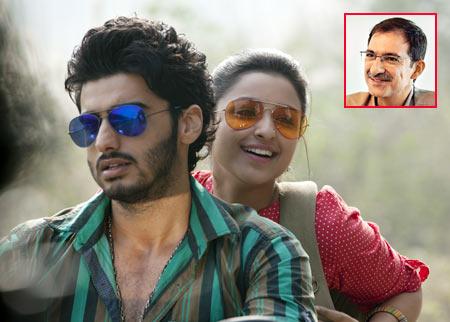
Habib Faizal is a man with suppressed anger.
Being an industry-man since over half a decade (he has written films like Ta Ra Rum Pum, Jhoom Barabar Jhoom and Band Baaja Baarat), the director blames the media for not paying sufficient attention to the screen-writers while incessantly writing about the actor-stars.
A director with a vibrant sense of imagination that usually runs around the towering aspirations of the country's middle-class, Faisal attained prominence with his 2010 film Do Dooni Chaar, which went on to win a National Award.
His next feature, the gritty action-romance saga, with an explosive title -- Ishaqzaade -- explores the dangerous liaison of Zoya and Parma set in a fictional small-town called Agmoh. It stars Parineeti Chopra and Arjun Kapoor.
Habib Faizal gets in an interesting chat with Ankur Pathak. Excerpts:
What is your fascination with the life and ambition of the country's middle-class that drives most of your stories?
I'm excited by whatever is happening around us. I find it exciting to find drama in everyday life. That everyday life could be some tycoons' life or some poor person's. I've just started, although it is a little late (he is 45), I want to make all kind of films from science fiction to political thrillers.
I have story ideas of many different varieties and slowly they will come out and you will see.
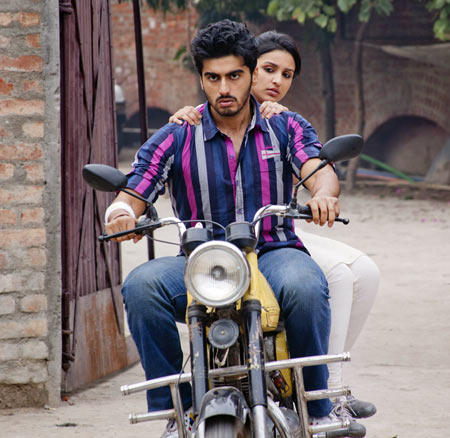
Would you say creating characters that belong to a particular demographic -- say Delhi -- is where you've found your comfort zone?
See, it is basically their staple language which I have sort of adapted very flexibly. So in that sense, what I do is, I use the spoken word as the material for my dialogue. It depends on which landscape my film is set across. When I wrote Jhoom Barabar Jhoom, there was a character who spoke French; so I figured out French and wrote the dialogues in that language. Bobby's character was a Punjabi living in Southall, so his lines were designed accordingly.
If you have a character who is a school teacher in Delhi and whose name is Santosh Duggal (Rishi Kapoor, Do Dooni Chaar), there is a particular graph which you stick to while writing his lines.
If you notice, in Band Baaja Baarat, they do their last wedding for a very rich family and you must've seen their interaction is a lot more polished and sophisticated as they adapt to the situation on-hand.
So does your fear lie in the fact that you'd be typecast as a screenwriter who is a master of Dilli-giri and hence get restricted demographically?
Oh yes! I'm running away from the tag as fast as I can. That mainly happened because both Do Dooni Chaar and Band Baaja Baarat released within a gap of a few months. After that, I have been offered like 150 films set in Delhi, which I don't want to pick up at all. I want to explore dramatically different genres and trust me; you will get to see them.
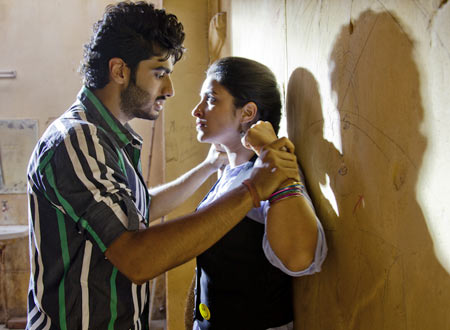
Let's start with your new film, Ishaqzaade. How is it different from your previous two films?
Ishaqzaade is, firstly, not in Delhi. It's in a fictitious town called Agmoh -- so the town is different, the people are different, and their language and their attitudes are different.
The Ishaqzaades -- Zoya (Parineeti Chopra) and (Parma) Arjun Kapoor -- come across as dynamically feisty individuals unafraid to indulge in youthful eccentricity. What does that reflect about the contemporary state of the smaller cities of India?
They are young people of present-day small town India. They are the people who've grown up in post-reform India. Now that the development that has reached small town, they don't feel the need to go to bigger cities to fulfill their aspirations. Now they say that their environment is less polluted than ours, they have bigger and better roads, considerably more space for swanky malls and there is a different culturally vibrant space in there which is flourishing. And there are better jobs. There is a new spring in the walk of the youth in the present-day small town.
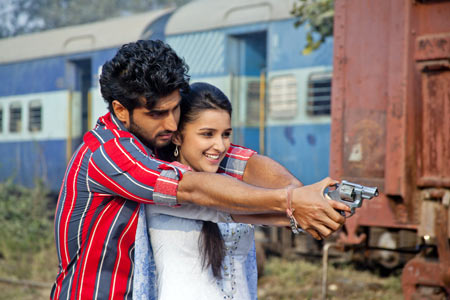
The love story is explored with an element of threat constantly present -- guns almost accompany every shot of the trailers. Was this a conscious decision to have the entire dangerous vibe to the romance?
You write a story. If the story needs humour, you write funny lines. If it is asking for a sense of thrill, you infuse it with something adventurous. With Arjun and Parineeti in Ishaqzaade, it was the demand of the characters. I wouldn't say that it was a conscious decision to put a gun in their respective hands just because it would look thrilling. It was the need of the characters that they do almost everything with the guns. When they fall in love, the guns go in with them!
So you are essentially propagating a love story with an underlying theme of violence?
The film is very anti-violence. To talk about fascism and to talk about peace, I need to show what violence can do to you. To show the destructive side of violence, you need to show violence which is why the need for all the action eventually arises.
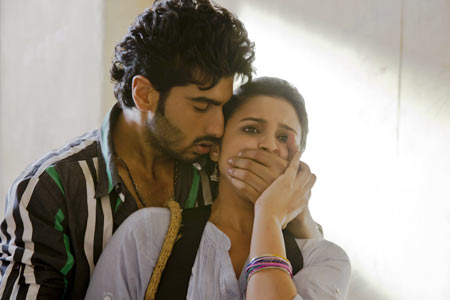
You've largely written scripts for Yash Raj (Salaam Namaste, Jhoom Barabar Jhoom, Band Baaja Baraat). This will be your first feature with them which is also your own script. Is it creatively more stimulating to direct something that you've written yourself?
I would love to direct something that is written by someone else. As long as the director and the writer are in sync with each other and share the vision, I'm open to somebody else's material. Band Baaja Baraat was Maneesh's vision to make a film on wedding planners. So when it's his vision, I become a crew member except what I do as a crew member is not a tangible thing, it is abstract.
You made your directorial debut with Do Dooni Chaar -- a film which was by large an independently financed film. How much of creative control is lost when you work under a studio?
None at all. Interestingly, I was planning to make Do Dooni Chaar with YRF except at that time, Aditya Chopra (owner, Yash Raj Films) was getting into the production of Rab Ne Bana Di Jodi and he couldn't green-light this project. On the other hand, I was on fire where I had this brilliant idea which I wanted to make a film on. So I got in touch with Planman Pictures who wanted a family film as such and they agreed to finance it.
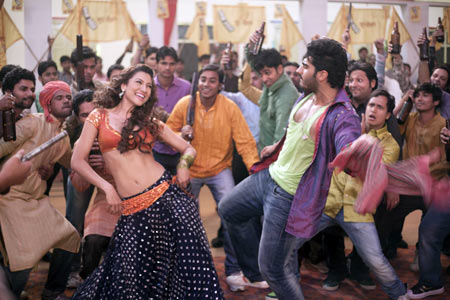
But how much is the studios' interference when you make as commercial a film as Ishaqzaade?
See, Aditya Chopra hires me as a director to let me make films the way I want to. He does not want me to make films the way he makes them. Yash Raj is not one single entity. Today, Yash Raj is a huge corporate -- it has Band Baaja, as well as Dhoom, and then a film like New York and then like Ek Tha Tiger, which you can call as very un-Yash Raj.
It's a misconception that Aditya Chopra interferes in the making of a film. Let me assure you that it is entirely the director's vision and it stays so till the film is cut at the editing table. Yes, because there is a producer who is also a director, we want to interact with him. But that is because he has a highly creative mind which has been historically proven (Dilwale Dulhaniya Le Jayenge, Aditya Chopra's directorial debut is still running in a Mumbai theatre) but there's no interference as such.
So it is an entirely Habib Faisal's call to include an item song like Chokra Jawaan?
Of course! In fact you go to see, we haven't even treated it like an item number. It is not the Chokree who gets Jawaan, it is the Chokraa. And I had one in my film because I love the idea of cliches. I love the cliche of the item song. There's reason why they work and I'm absolutely fine with the idea.